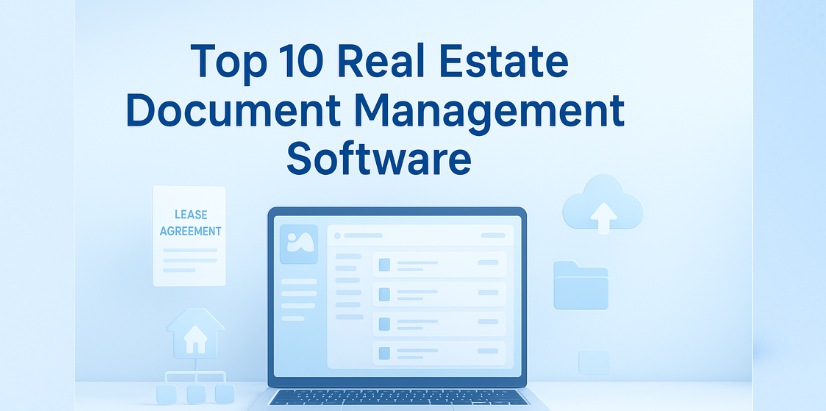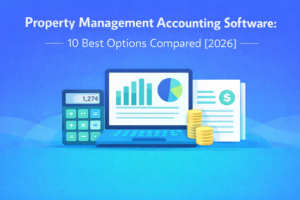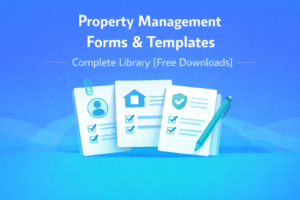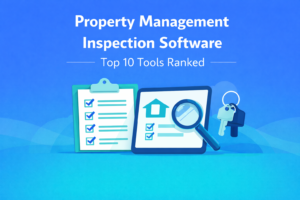
Buried under paperwork? You’re not the only one. Have you ever had to dig through a dozen emails to locate a single signed lease, or wasted hours matching scanned contracts with property records? If yes, then you understand how disorganized real estate documents can become. Between lease agreements, inspection reports, title deeds, financial statements, maintenance logs, and compliance papers, even a small property portfolio can create thousands of files each year. And when those documents reside in separate folders, inboxes, or drives, your time and your peace of mind suffer. That is why real estate document management software is necessary.
These systems are your digital filing cabinet, compliance tracker, and workflow assistant, all in one. But with so many tools available, which is best for you? Let’s take a look at the top real estate document management software for property managers and discover how the right system can save hours each week, cut risk, and make your whole operation easier.
What Is Real Estate Document Management Software?
Real estate document management software (or DMS) is an online platform that assists real estate professionals to store, organize, monitor, and secure property-related documents. It’s basically Google Drive, but specifically created for real estate.
These systems are designed for:
- Property managers juggling multiple leases and tenant files
- Real estate agents and brokers who are juggling listings, offers, and sales contracts
- Developers and investors who require clear access to legal and financial documents
- Facility and HOA managers who monitor compliance reports and vendor agreements
Examples of Documents Managed:
- Lease agreements
- Tenant applications
- Title deeds & mortgage documents
- Vendor contracts
- Property inspection reports
- Maintenance logs
- Compliance certificates
- Financial statements & tax files
Fun Fact:
According to a report by Grand View Research, the size of the global document management system market was estimated at USD 7.68 billion in 2024 and is projected to reach USD 18.17 billion by 2030.
Why Property Professionals Need Document Management Software
Real estate is one of the most paper-intensive industries on the planet. From tenant turnover to legal requirements and financial auditing, manual management isn’t only unproductive but it’s dangerous. Property managers need document management software because of the following reasons:
1. Save Time
No more searching through inboxes or resending signed versions. With DMS, you can locate any document in seconds with smart search or filters (like “lease expiring next month”).
2. Improve Collaboration
Agents, landlords, and tenants can securely share documents, with no more endless email threads.
3. Stay Compliant
Most tools automatically timestamp and store documents for audit trails, assisting you in satisfying regional housing and legal requirements.
4. Secure Sensitive Data
Encryption, access controls, and cloud backups safeguard financial and personal information from loss or breaches.
5. Reduce Paper & Printing Costs
Go paperless, go green, while minimizing storage expense and admin burden.
What To Look For in the Best Real Estate Document Management Software
When you are looking for real estate document management software, look at how well the software integrates with your workflow, not the pursuit of every feature. Here’s what real estate professionals should be looking for:
| Feature | Why It Matters |
| Cloud Storage & Accessibility | Work from anywhere — mobile, tablet, or desktop. |
| Version Control | Keep track of document edits and prevent overwriting. |
| E-Signature Integration | Speed up lease signings and contract approvals. |
| OCR (Optical Character Recognition) | Convert scanned files into searchable, editable text. |
| Automation & Workflows | Automatically name, categorize, and route documents. |
| Role-Based Access | Limit who can view, edit, or share sensitive files. |
| Audit Trail | Maintain transparency and meet compliance requirements. |
| Integration with Property Management Tools | Seamlessly connect with accounting, leasing, and CRM systems. |
Pro Tip: If you’re already using tools like NetSuite, QuickBooks, or Propertese, make sure your DMS integrates easily with them for a unified ecosystem.
Top 10 Real Estate Document Management Software in 2025
Let’s discuss the best software solutions that real estate professionals are utilizing to effectively manage their documents.
1. Propertese
Best for:
Real estate companies, developers, and property managers looking for a fully integrated management system.
Why it stands out:
Propertese is not only a document manager, it’s a full-service real estate operations suite. From unit and property management to lease and investment tracking, maintenance requests, and contract management, it consolidates all functions into one system.
Key Features:
- Single document repository for all property documents
- NetSuite and other ERP integrations
- Contract workflows & lease renewal automation
- Role-based access & electronic approval flows
- Localization for region-based compliance
- Community association management
- Real-time reporting & dashboards
Bonus:
Tenants and landlords can retrieve documents via a self-service portal.
2. M-Files
Best for:
Large brokerages and compliance-oriented firms. M-Files employs metadata to structure files smartly. Rather than folders, it groups documents according to what they are, rather than where they’re located.
Highlights:
- AI-powered search
- Automated audit trail with version control
- Smooth integration with CRM and ERP systems
- Automation of approvals and renewals workflows
3. DocuWare
Best for:
Teams seeking advanced automation and secure archiving, DocuWare is popular in both the real estate and finance sectors. It offers a robust e-signature workflow and detailed permission settings.
Features:
- Digital signatures
- Template-based document filing
- Cloud and on-premises deployment
- GDPR and SOC2 compliant
4. PandaDoc
Best for:
Real estate agencies focusing on digital contracts and proposals. PandaDoc makes lease and sales agreement workflows effortless.
Key Advantages:
- Drag-and-drop contract templates
- Real-time tracking for document views and signatures
- Integration with CRMs such as HubSpot and Salesforce
- Embedded eSignature compliance
Example:
A real estate agent can set up a new lease template once and use it for hundreds of tenants, saving hours each month.
5. Zoho WorkDrive
Best for:
Small to medium property teams. A cost-effective, collaborative solution with file sharing, version history, and team folders.
Highlights:
- Secure client portals
- Live document collaboration
- 100GB+ cloud storage per user
- Integrates well with Zoho CRM and Books
6. Box for Real Estate
Best for:
Businesses require secure, compliant document storage. Box’s enterprise-grade encryption and workflow automation make it a favorite among big property firms.
Features:
- Audit log-enabled file sharing
- AI-powered document scanning
- Box Relay custom workflows
- Microsoft 365, Google Workspace, and Salesforce integrations
7. OpenDocMan
Best for:
Open-source proponents or teams with bespoke requirements. A lightweight, open-source document management system with rudimentary versioning and web-based access.
Pros:
- Free and highly customizable
- Easy-to-use interface
- Role-based access control
Cons:
Limited support for integrations and automation.
8. SharePoint (Microsoft 365)
Best for:
Existing Microsoft ecosystem users. SharePoint allows teams to store, manage, and collaborate on property documents securely in the cloud.
Benefits:
- Enterprise-level security
- Version tracking
- Power Automate automated workflows
- Perfect for document-intensive property management teams
9. Google Workspace
Best for:
Small real estate offices with simple collaboration requirements. Though non-industry-specific, Google Workspace remains popular among small teams due to simplicity.
Advantages:
- Simple file sharing & permission management
- Integration with hundreds of real estate CRMs
- Affordable pricing tiers
10. Laserfiche
Best for:
Enterprises looking to prioritize automation and compliance. Laserfiche is powerful in workflow automation, document routing, and granular permissioning.
Top Features:
- Advanced metadata tagging
- Audit-ready document tracking
- AI-driven search capabilities
- Integration with financial and CRM tools
Comparison Table
| Software | Best For | Key Features | Starting Price |
| Propertese | Property managers, developers | All-in-one platform with document & investment management | Custom quote |
| M-Files | Compliance-heavy firms | AI organization & automation | $20/user/mo |
| DocuWare | Secure cloud storage | e-signature & version control | Custom quote |
| PandaDoc | Contracts & proposals | Templates, tracking, e-signatures | $19/user/mo |
| Zoho WorkDrive | SMBs | Collaboration & storage | $2.50/user/mo |
| Box | Enterprises | Secure sharing & workflows | $15/user/mo |
| OpenDocMan | Custom dev teams | Open-source, basic features | Free |
| SharePoint | Microsoft users | Collaboration & automation | Included in M365 |
| Google Workspace | Small offices | Basic storage & sharing | $6/user/mo |
| Laserfiche | Enterprises | Workflow automation | Custom quote |
How to Choose the Right Document Management Software for Your Real Estate Business
Here’s a five-step framework to make an informed decision:
1. Map Your Workflow
Write down all touchpoints where documents are created, reviewed, or shared. E.g., lease renewals, vendor contracts, HOA communications.
2. Identify Integration Needs
Verify whether your CRM, accounting, or ERP systems (such as NetSuite) require syncing with the DMS.
3. Evaluate Security Requirements
If you process tenant financial information, search for SOC2, GDPR, or ISO-certified platforms.
4. Consider Scalability
Your document load increases with your property portfolio. Choose cloud systems that scale seamlessly.
5. Test Usability
A too-complicated tool will slow your team down. Most vendors include free trials — use them.
FAQs
Q. What is the best document management software for real estate professionals?
The most suitable document management software for real estate professionals will be based on your requirements. For end-to-end property management, Propertese is the best. For contract workflows, PandaDoc is excellent. For enterprise-level compliance, Box or M-Files are safe choices.
Q. How does document management software help property managers?
It digitizes leases, automates renewals, and centralizes documents in one location. Property managers can manage every file without having to change tools.
Q. Is document management software secure for real estate firms?
Yes, the majority of systems provide end-to-end encryption, role-based access, and cloud backups, protecting all property and tenant information from being compromised.
Q. Can I integrate document management software with property management systems?
Absolutely. Solutions such as Propertese and M-Files connect to ERPs such as NetSuite, accounting systems, and CRM software to keep workflows unified.
Real Estate Industry Insights
- According to the National Association of Realtors, 62% of agents mention “paperwork and administrative tasks” as one of the chief problems.
- Digital transaction management solutions cut lease turnaround time by up to 50%, says Zillow Research.
- Paper storage is a $1,200 annual cost per employee on average, according to Forbes Real Estate Council data.
Migrating from a traditional document management system to a cloud-based system not only saves time but also improves compliance and client satisfaction.
Emerging Trends in Real Estate Document Management
1. AI-Powered Document Tagging
AI tools automatically identify and tag documents. For example, a lease versus an inspection report.
2. Blockchain Verification
Specific current DMS solutions are employing blockchain to authenticate ownership and avoid document tampering.
3. Mobile Accessibility
Mobile-first design is becoming the norm, enabling property teams to upload and refer to documents on site visits.
4. Automated Compliance Monitoring
The system warns managers when licenses are near expiration, insurance is out of date, or there are missing safety reports.
5. E-Signature Standardization
Digital signatures are now legally binding in more than 180 nations, making remote transactions easier.
Real-World Example
Imagine you manage 200 rental units across three cities. Without a DMS:
- Lease renewals are manually tracked in Excel.
- Maintenance requests arrive via text, email, and WhatsApp.
- Contractors send invoices as PDFs without version control.
Now, using a platform like Propertese:
- All contracts are stored in one secure dashboard.
- Renewal notifications trigger automatically.
- Invoices are matched to maintenance records.
- Landlords, tenants, and vendors access files through a unified portal.
This is called operational excellence.
Measuring ROI of Document Management Software
How do you know your DMS investment is paying off? Track these key metrics:
| Metric | Before DMS | After DMS |
| Time spent searching documents | 3-4 hours/week | <30 minutes/week |
| Lease turnaround time | 7 days | 2 days |
| Compliance errors | Frequent | Rare |
| Document loss incidents | 1-2/month | 0/month |
| Customer satisfaction (CSAT) | 75% | 90%+ |
Within a few months, most teams see productivity improvements of 30–50%.
The Future
The real estate management future is integration (bringing document management, accounting, leasing, and communication together under one umbrella). That’s where Propertese excels, not only as a DMS, but as a complete real estate operating system.
It combines:
- Property & Unit Management
- Investment & Subsidiary Management
- Maintenance Request Handling
- Contract & Compliance Automation
- Reporting, Localization, and Community Management
- Online rent payments and communication tools
Final Thoughts
In real estate, every paper has a story to tell: a lease, a sale, an investment. But without those stories accessible and usable, they’re worth nothing. By implementing the proper real estate document management software, you regain time, minimize stress, and introduce order to chaos. From individual-property landlords to handling thousands of units, software such as Propertese, M-Files, or Box can revolutionize the way you work.
Start small. Digitize your leases. Automate renewals. Then scale up.
Ready to go paperless and productive? Explore Propertese today.
Table of Contents
Stay Updated
Subscribe to get the latest news, industry trends, blog posts, and updates...




